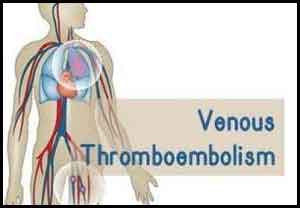- Home
- Editorial
- News
- Practice Guidelines
- Anesthesiology Guidelines
- Cancer Guidelines
- Cardiac Sciences Guidelines
- Critical Care Guidelines
- Dentistry Guidelines
- Dermatology Guidelines
- Diabetes and Endo Guidelines
- Diagnostics Guidelines
- ENT Guidelines
- Featured Practice Guidelines
- Gastroenterology Guidelines
- Geriatrics Guidelines
- Medicine Guidelines
- Nephrology Guidelines
- Neurosciences Guidelines
- Obs and Gynae Guidelines
- Ophthalmology Guidelines
- Orthopaedics Guidelines
- Paediatrics Guidelines
- Psychiatry Guidelines
- Pulmonology Guidelines
- Radiology Guidelines
- Surgery Guidelines
- Urology Guidelines
How long anticoagulation to be continued after Venous Thromboembolism-A dilemma

It is a dilemma to decipher for how long anticoagulation needs to be continued after Venous Thromboembolism. Anticoagulant treatment is highly effective at reducing the risk of recurrent venous thromboembolism (VTE) after a first episode of unprovoked VTE, but this clinical benefit is not maintained once anticoagulation is discontinued.
The researchers have found in a systematic review and meta-analysis that when anticoagulation is stopped after initial treatment, the cumulative incidence of recurrent VTE is 10%, 16%, 25%, and 36% at 1, 2, 5, and 10 years, respectively.
For patients with unprovoked venous thromboembolism (VTE), comprising deep vein thrombosis and pulmonary embolism, the optimal duration of anticoagulant treatment is uncertain. After three to six months of initial anticoagulation, extended treatment is highly effective at reducing the risk of recurrent VTE,but this clinical benefit is not maintained when anticoagulation is stopped.
Clinicians are often at their wits end in deciding whether to continue anticoagulation indefinitely in patients with unprovoked venous thromboembolism (VTE). In this meta-analysis, researchers pooled data from 18 randomized trials or prospective cohort studies and estimated long-term rates of recurrent VTE in 7500 patients with unprovoked VTE whose anticoagulation was stopped after at least 3 months.
Their main findings were as follows:
- Cumulative incidence of recurrent VTE was 10%, 16%, 25%, and 36% at 1, 2, 5, and 10 years, respectively; 10-year cumulative incidence was lower in women than in men (29% vs. 41%).
- Cumulative 2-year rate of recurrent VTE was slightly higher in patients whose initial event was proximal deep venous thrombosis (with or without pulmonary embolism) than in those whose initial event was isolated pulmonary embolism (≈17% vs. 12%). In patients with isolated distal deep venous thrombosis, 1-year VTE rate was only 2% (longer-term data were not available).
- Cumulative incidence of fatal pulmonary embolism was 0.4%, 0.7%, 1.0%, and 1.5% at 1, 2, 5, and 10 years, respectively.
The researchers concluded that in patients with a first episode of unprovoked VTE who have completed at least three months of anticoagulant treatment, the risk of recurrent VTE after discontinuing anticoagulation reached 10% in the first year, 16% at 2 years, 25% at 5 years, and 36% at 10 years, with 4% of recurrent VTE events resulting in death. These findings provide rigorous benchmarks of the long term risks and consequences of recurrent VTE that should inform clinical practice guidelines, enhance confidence in counselling patients of their prognosis, and help guide decision making about long term management of unprovoked VTE.
For more details click on the link: https://doi.org/10.1136/bmj.l4363

Disclaimer: This site is primarily intended for healthcare professionals. Any content/information on this website does not replace the advice of medical and/or health professionals and should not be construed as medical/diagnostic advice/endorsement or prescription. Use of this site is subject to our terms of use, privacy policy, advertisement policy. © 2020 Minerva Medical Treatment Pvt Ltd